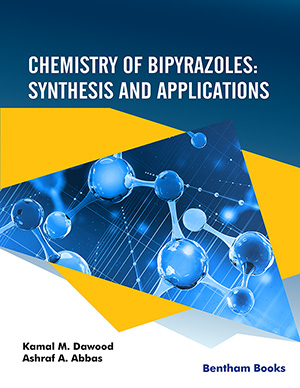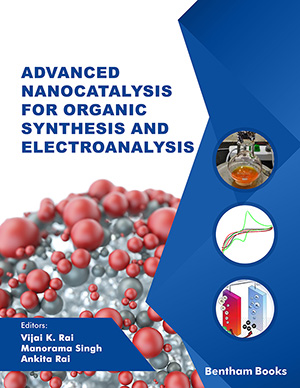
Abstract
Hormone-sensitive breast cancers correspond to breast tumors with the existence of estrogen and progesterone in the tumor issue. The hormones estrogen and progesterone may in some circumstance promote the growth of breast cancers. Therefore, compounds targeting hormone-sensitive breast cancers have attracted considerable interest from synthetic organic chemists. In the past two decades, numerous compounds have thus been designed and synthesized to investigate their anti-breast cancer activities. In this review, some recent synthetic endeavor in the past five years towards compounds targeting hormone-sensitive breast cancers, especially estrogenreceptor positive breast cancers, are summarized.
Keywords: Anti-breast cancer, Estrogen-receptor, ER-positive, hormone-sensitive, MCF-7, stereo-control, synthesis, total synthesis.
Current Organic Chemistry
Title:Some Recent Synthetic Development on Compounds with Potent Activities on Hormone-sensitive Breast Cancers
Volume: 19 Issue: 10
Author(s): Zheng Wang, Hui-Lei Gao and Xu-Dong Chen
Affiliation:
Keywords: Anti-breast cancer, Estrogen-receptor, ER-positive, hormone-sensitive, MCF-7, stereo-control, synthesis, total synthesis.
Abstract: Hormone-sensitive breast cancers correspond to breast tumors with the existence of estrogen and progesterone in the tumor issue. The hormones estrogen and progesterone may in some circumstance promote the growth of breast cancers. Therefore, compounds targeting hormone-sensitive breast cancers have attracted considerable interest from synthetic organic chemists. In the past two decades, numerous compounds have thus been designed and synthesized to investigate their anti-breast cancer activities. In this review, some recent synthetic endeavor in the past five years towards compounds targeting hormone-sensitive breast cancers, especially estrogenreceptor positive breast cancers, are summarized.
Export Options
About this article
Cite this article as:
Wang Zheng, Gao Hui-Lei and Chen Xu-Dong, Some Recent Synthetic Development on Compounds with Potent Activities on Hormone-sensitive Breast Cancers, Current Organic Chemistry 2015; 19 (10) . https://dx.doi.org/10.2174/1385272819666150123000346
| DOI https://dx.doi.org/10.2174/1385272819666150123000346 |
Print ISSN 1385-2728 |
| Publisher Name Bentham Science Publisher |
Online ISSN 1875-5348 |
Call for Papers in Thematic Issues
Advances of Heterocyclic Chemistry with Pesticide Activity
Global food safety and security will continue to be a global concern for the next 50 years and beyond. Plant diseases have had a significant impact on food safety and security throughout the entire food chain, from primary production to consumption. While conventional chemical pesticides have been traditionally used for ...read more
Carbohydrates conversion in biofuels and bioproducts
Biomass pretreatment, hydrolysis, and saccharification of carbohydrates, and sugars bioconversion in biofuels and bioproducts within a biorefinery framework. Carbohydrates derived from woody biomass, agricultural wastes, algae, sewage sludge, or any other lignocellulosic feedstock are included in this issue. Simulation, techno-economic analysis, and life cycle analysis of a biorefinery process are ...read more
Catalytic C-H bond activation as a tool for functionalization of heterocycles
The major topic is the functionalization of heterocycles through catalyzed C-H bond activation. The strategies based on C-H activation not only provide straightforward formation of C-C or C-X bonds but, more importantly, allow for the avoidance of pre-functionalization of one or two of the cross-coupling partners. The beneficial impact of ...read more
Cutting-edge technology for the development of electrochemical sensors
Electrochemistry based point of care diagnostics is a powerful tool which can revolutionize the current concept of personalize health care industry. There have been several efforts to amalgamate cutting edge technologies (nanotechnology, surface technology, anti-biofouling strategies) while developing assays. The success of each electrochemical sensor is very dependable upon how ...read more
Related Journals
 25
25
- Author Guidelines
- Graphical Abstracts
- Fabricating and Stating False Information
- Research Misconduct
- Post Publication Discussions and Corrections
- Publishing Ethics and Rectitude
- Increase Visibility of Your Article
- Archiving Policies
- Peer Review Workflow
- Order Your Article Before Print
- Promote Your Article
- Manuscript Transfer Facility
- Editorial Policies
- Allegations from Whistleblowers
- Announcements
Related Articles
-
Aromatase: The Enzyme and Its Inhibition
Anti-Cancer Agents in Medicinal Chemistry Novel Symmetrical 1,4-Disubstituted-bis-1,2,3-Triazoles: Synthesis by Double CuAAC and Cytotoxicity Evaluation
Current Topics in Medicinal Chemistry The Use of Immunotherapy to Treat Metastatic Breast Cancer
Current Medicinal Chemistry Contemporary Progress in the Synthetic Strategies of Imidazole and its Biological Activities
Current Organic Synthesis Cardiovascular Effects of the Phytoestrogen Genistein
Current Medicinal Chemistry - Cardiovascular & Hematological Agents Recent Progress in the Development of Anticancer Agents
Current Medicinal Chemistry - Anti-Cancer Agents Drug Targeting of Estrogen Receptor Signaling in the Cardiovascular System: Preclinical and Clinical Studies
Current Medicinal Chemistry - Cardiovascular & Hematological Agents Evolutionary Significance of Iodine
Current Chemical Biology Vitamin D and miRNAs in Cancer
Current Gene Therapy Activation of the dsRNA-Activated Protein Kinase PKR in Mitochondrial Dysfunction and Inflammatory Stress in Metabolic Syndrome
Current Pharmaceutical Design PPARs as Drug Targets to Modulate Inflammatory Responses?
Current Drug Targets - Inflammation & Allergy Role of Mitochondrial Heat-shock Proteins and Immunophilins in Neuro Degenerative Diseases
Current Drug Targets Anticancer Activity of Natural Flavonoids: Inhibition of HIF-1α Signaling Pathway
Current Organic Chemistry Drug Combinations Enhancing the Antineoplastic Effects of Erlotinib in High-Grade Glioma
Recent Patents on Anti-Cancer Drug Discovery Multiple Perspectives in Anti-cancer Drug Discovery: From old Targets and Natural Products to Innovative Computational Approaches
Anti-Cancer Agents in Medicinal Chemistry Implication of Possible Therapies Targeted for the Tachykinergic System with the Biology of Neurokinin Receptors and Emerging Related Proteins
Recent Patents on CNS Drug Discovery (Discontinued) Gene Therapy Using IL-12 Family Members in Infection, Auto-Immunity, and Cancer
Current Gene Therapy Ethnopharmacological Uses, Pharmacological Activities, and Therapeutic Applications of Tectochrysin in Medicine: An Important Class of Dietary Flavonoid
Cardiovascular & Hematological Disorders-Drug Targets Breast Cancer Transcriptional Regulatory Network Reprogramming by using the CRISPR/Cas9 System: An Oncogenetics Perspective
Current Topics in Medicinal Chemistry Ascorbic Acid in Cancer Chemoprevention: Translational Perspectives and Efficacy
Current Drug Targets

























